|
|
|
Sort Order |
|
|
|
Items / Page
|
|
|
|
|
|
|
| Srl | Item |
| 1 |
ID:
069607
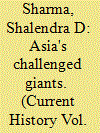

|
|
|
| 2 |
ID:
065642
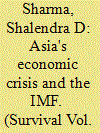

|
|
|
|
|
| Publication |
1998.
|
| Description |
p.27-52
|
|
|
|
|
|
|
|
|
|
|
|
|
|
|
|
| 3 |
ID:
097397
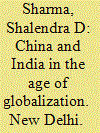

|
|
|
|
|
| Publication |
New Delhi, Cambridge University Press, 2009.
|
| Description |
xi, 321p.
|
| Standard Number |
9780521198936, hbk
|
|
|
|
|
|
|
|
|
|
|
|
Copies: C:1/I:0,R:0,Q:0
Circulation
| Accession# | Call# | Current Location | Status | Policy | Location |
| 055050 | 303.48251/SHA 055050 | Main | On Shelf | General | |
|
|
|
|
| 4 |
ID:
102254
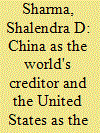

|
|
|
|
|
| Publication |
2010.
|
| Summary/Abstract |
China is now the world's leading creditor nation, while the United States is the world's largest debtor. Beijing is the largest foreign holder of US government debt - passing Japan in 2008 to become, in effect, the US government's largest foreign creditor. While some claim this gives Beijing unprecedented power over the United States, others claim that China's power is in fact greatly circumscribed. This paper shows that although current patterns of economic interdependence between the two economies invariably pushes each towards cooperation, China is deeply concerned about the future trajectory of the US economy and is already engaged in loosening the bonds of interdependence. This has profound implications for Sino-US relations and the global economy.
|
|
|
|
|
|
|
|
|
|
|
|
|
|
|
|
| 5 |
ID:
086602
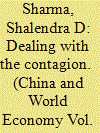

|
|
|
|
|
| Publication |
2009.
|
| Summary/Abstract |
What began as a downturn in the US housing sector in the summer of 2007 had mushroomed into a global financial crisis by September 2008: the most severe since the 1930s. Developing countries, including China and India, at first seemingly sheltered from the worst of the turmoil, have not been immune to the contagion's spillover effects. What are China and India's precise vulnerabilities, and what can each do to better insulate their economies from the vagaries of global financial marker turmoil? Equally important, what long-term strategies must each country adopt to make their economies more resilient to global market downturns?
|
|
|
|
|
|
|
|
|
|
|
|
|
|
|
|
| 6 |
ID:
000730
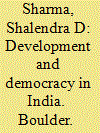

|
|
|
|
|
| Publication |
Boulder, Lynne Rienner, 1999.
|
| Description |
xx, 282p.
|
| Standard Number |
1555878105
|
|
|
|
|
|
|
|
|
|
|
|
Copies: C:1/I:0,R:0,Q:0
Circulation
| Accession# | Call# | Current Location | Status | Policy | Location |
| 042132 | 338.954/SHA 042132 | Main | On Shelf | General | |
|
|
|
|
| 7 |
ID:
134952
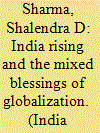

|
|
|
|
|
| Summary/Abstract |
India has been a major beneficiary of economic globalisation. Yet, integration into the global economy has also made India vulnerable to the unpredictable swings in market sentiment. Nevertheless, the ultimate effects of cross-border economic forces also depend on the robustness of domestic policies. Potential vulnerabilities such as disruption in trade or financial flows can be mitigated by sound macroeconomic policies. Although ‘licence raj’ and ‘export pessimism’ is now a thing of the past, India’s quasi-protectionist policies, coupled with the failure to deepen its integration into the global economy, have made the economy increasingly vulnerable to external forces—as seen when the United States Federal Reserve announced its decision to unwind its stimulus programme in mid-2013, resulting in deep sell-offs in emerging economies, especially India’s currency, bond and equity markets.
|
|
|
|
|
|
|
|
|
|
|
|
|
|
|
|
| 8 |
ID:
183853
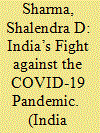

|
|
|
|
|
| Summary/Abstract |
In early 2020, when the COVID-19 pandemic was indiscriminately spreading around the world, the seeming ability of India, the world’s second most populous country (with over 1.3 billion people), to contain the virus within its borders and keep COVID-19 infection and mortality rates low relative to population size was seen as miraculous. However, the miracle ended when the ‘second-wave’ hit India in April 2021. On 1 May 2021, India became the first country in the world to record more than 400,000 coronavirus infections in a single day. This exponential rise in COVID-19 cases started on 28 April 2021 when India recorded 379,459 new COVID-19 cases and 3,647 deaths. This marked the eighth straight day of more than 300,000 cases a day—making India the second-highest COVID-19 case count in the world (over 20 million) with over 25 per cent of the global deaths from COVID. The following examines India’s fight against the pandemic, the failure to contain the second wave, the lessons learned and the way forward.
|
|
|
|
|
|
|
|
|
|
|
|
|
|
|
|
| 9 |
ID:
101755
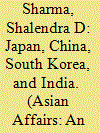

|
|
|
| 10 |
ID:
165949
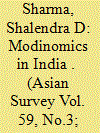

|
|
|
|
|
| Summary/Abstract |
An assessment of Modi’s economic policies (“Modinomics”) shows that the gap between intentions and outcomes remains wide because Modinomics has been too cautious and contradictory to overcome the unusual structural challenges facing India’s economy. Moreover, the contradictions of Modinomics, which privileges trade protectionism and selective financial-sector liberalization, limits the potential gains from deeper global economic integration. This article argues that deepening economic reforms, including integration into the global economy, can help mitigate the structural impediments facing the Indian economy.
|
|
|
|
|
|
|
|
|
|
|
|
|
|
|
|
| 11 |
ID:
105536
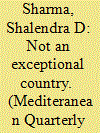

|
|
|
| 12 |
ID:
090767
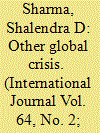

|
|
|
|
|
| Publication |
2009.
|
| Summary/Abstract |
Like the financial crisis, the severity of the food crisis caught gobernments around the world by surprise. This confusion and unpreparedness was vividly reflected by the former leader of the world's richest and most powerful nation, US President George W. Bush, whose initial reaction was to blame developing countries implicitly for the crisis by noting that when poor countries like India and China prosper, they start demanding better nutrition and better food and when demand is high, that causes the pricess to go up.
|
|
|
|
|
|
|
|
|
|
|
|
|
|
|
|
| 13 |
ID:
092208
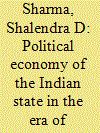

|
|
|
|
|
| Publication |
2009.
|
| Summary/Abstract |
The origins and nature of the post-Independence Indian state have been the subject of much research and debate among scholars and political activists. The state has been contradictorily and colourfully characterised as 'strong-weak', 'soft', 'overdeveloped', 'captured', a 'weak developmental state', and more recently as 'a divided Leviathan'-among other metaphors. It seems that India's democratic state has the ability to confound by displaying remarkable adaptability and resilience. Nowhere perhaps is this reflected more vividly than in India's dramatic abandonment, in 1991, of its decades-long commitment to a statist and inward-oriented economy model for an unprecedented and ambitious strategy of global economic integration.
|
|
|
|
|
|
|
|
|
|
|
|
|
|
|
|
| 14 |
ID:
057673
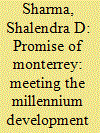

|
|
|
| 15 |
ID:
082293
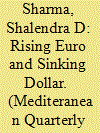

|
|
|
| 16 |
ID:
176550


|
|
|
|
|
| Summary/Abstract |
The liberal international economic and political order which the United States created from the ashes of World War II and has since led is in trouble. To United States President Donald Trump, the order which provided the framework under which sovereign states agreed to follow a rules-based system of economic and political cooperation and shared multilateral governance, has not only allowed other nations (in particular, China) to take advantage of US ‘magnanimity’, but also weakened the United States economically, while asymmetric alliances compromised its military advantages. Given the sustained assault this cosmopolitan order is facing, many fear that it may not survive if Trump is re-elected in November 2020. Indeed, if the United States response to the COVID-19 pandemic is any guide, an ‘America First’ agenda, especially a hard-line approach to China, will shape US policy if Trump wins a second term.
|
|
|
|
|
|
|
|
|
|
|
|
|
|
|
|
| 17 |
ID:
098406
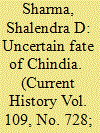

|
|
|
|
|
| Publication |
2010.
|
| Summary/Abstract |
Although Sino-Indian relations have greatly improved over the past decade..{u}nresolved territorial disputes, China's unconditional support of Pakistan, and growing competition for energy resources and regional influence could quickly derail hard-won gains.
|
|
|
|
|
|
|
|
|
|
|
|
|
|
|
|
| 18 |
ID:
104073
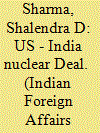

|
|
|
| 19 |
ID:
146013


|
|
|
| 20 |
ID:
104306
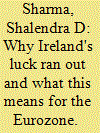

|
|
|
|
|
| Publication |
2011.
|
| Summary/Abstract |
Given its impressive economic performance over the past two decades, Ireland earned the title, the 'Celtic Tiger'. However, as the contagion from the subprime-induced global financial crisis spread, Ireland's boom went bust. In short order, Ireland (like Greece before it), had to seek financial assistance from the EU and the IMF to stave off sovereign default and national humiliation. How did Dublin and the eurozone respond to the crisis and what lessons can be learned from Ireland's experience? While Ireland grapples with its huge public debt, the EU needs to instill confidence in the markets before the current rolling debt crisis becomes a systemic threat to the eurozone.
|
|
|
|
|
|
|
|
|
|
|
|
|
|
|
|
|
|
|
|
|